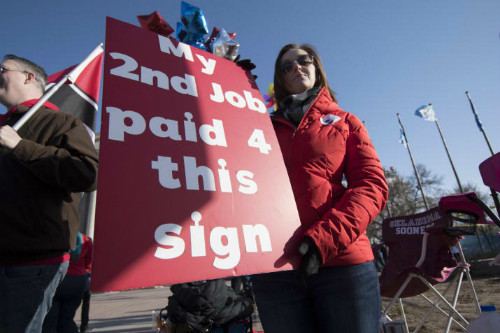Salaries not enough to pay the bills, many dedicated teachers in the US quit their jobs
Unexpected expenses like worn tires left Heath reeling. The American teacher couldn't wait any longer for a raise.
Last year, high school teacher Mallory Heath assigned her students an essay assignment that answered the fundamental question: “Who am I?”
It was Heath’s fifth year at Basha High School in Chandler, Arizona, her hometown. “If I didn’t teach, I wouldn’t know who I was,” the 30-year-old teacher reflected on her own answer.
According toBuzzFeed NewsApril 11, despite putting all his heart into his work, Heath could not make ends meet on his meager salary.Her essay turned into an open letter to Arizona Governor Doug Ducey, expressing frustration over the poor education budget.
“I graduated from college and can’t even make a middle-class salary? When you cut budgets across the state, I want to know if you do it with a smile. I am so angry. When I think about the injustice and neglect of teachers, I want to scream until I lose my voice. I don’t even make enough money to pay my bills,” she wrote.
Heath posted on social mediaLinkedInand the letter went viral, attracting the attention of local media. Just over a year later, on March 30, Heath sadly wrote a letter of resignation. The 11th and 12th graders knew she still loved her job, but she told them she couldn’t stay.
Salary kills passion
Heath knew her burning desire was to help children. She realized that becoming a teacher was one of the most effective ways to do that. Heath took English courses in Arizona State University's education program, graduating in 2012 with a 4.13 grade point average.
Teaching was like magic for Heath. From the moment she first walked into Basha High School, she was captivated by the caring staff and the sense of family.
Her starting salary was $35,800 a year, which sounded good to Heath. When she got her first check for $945 after 60-hour weeks, she remained optimistic. Veteran teachers had told her that if she could get through the first few years of hardship, she could live comfortably in the middle class.
|
Heath struggled mentally before deciding to quit his job. Photo:BuzzFeed News |
Her first year teaching was also the first year that Chandler Unified School District salaries had dropped after seven years of stability, hit by the recession. Nationally, education budgets are 6 percent lower than they were in 2008. In Arizona, the situation was worse. The state cut budgets, then cut taxes. A $10,000 raise for those with a master’s degree was reduced to $1,000. Heath and her classmates had a very different experience than teachers who had entered the profession just a few years earlier.By 2016, 42% of Arizona teachers hired in 2013 had left the public school system.
Heath is determined to beat the odds. She wakes up at 5 a.m., listens to education podcasts on her drive to school, and grades papers when she gets home 12 hours later. She never stops thinking about “her kids,” as she calls her beloved students. Occasionally, years after leaving school, a former student thanks her for helping her through the tough years of school. So, in a way, her work is paying off.
Heath had no student loans and no financial responsibility for a family. But with a college degree, six years of experience, and professional recognition, she couldn’t make enough money to support herself, forcing her to find a roommate to share the financial burden. Like 16 percent of American teachers, Heath had to take on a second job. She worked at a steakhouse for a year and a half, but quit because she couldn’t balance it with teaching.
After five years, Heath’s salary had risen to $42,812 a year, but it still wasn’t enough. Basic bills ran about $2,500 for her mortgage, insurance, gas, groceries, and utilities. After taxes, she was left with $2,200, $300 below her needs. Her frustrations were compounded by worn tires.
“When I know I need to replace something, it’s like a punch in the stomach. I have a pair of glasses I’ve had since I was 19, and I have to glue them down because I can’t afford a new pair,” she said.
Community Response to 2,100-Word LetterHeath was overwhelmed. Parents of former students thanked her, and teachers across Arizona and across the country expressed sympathy. Some offered to buy Heath new tires, one of the unexpected expenses she dreaded thinking about.
But last fall, Heath knew her career was not sustainable. She entered the 2017-2018 school year facing the challenges of her final year on the podium.
The gap teachers leave behind
The teacher shortage has been alarming for years as veterans retire, young educators burn out under the strain of overwork, and college students opt for more lucrative careers. The U.S. education system is in crisis, with a series of mass strikes in West Virginia, Oklahoma, and Kentucky earlier this year over pay freezes and budget cuts. Teachers in Arizona have also threatened mass strikes unless the government seeks change.
Adjusted for inflation, the average salary of a high school teacher in Arizona in 2016 was down 10 percent from 2001. Teachers like Heath, while passionate about their work, can't wait much longer for a raise.
Arizona has long been at the bottom of the rankings for teacher salaries and per-pupil spending, along with Oklahoma, West Virginia, Idaho, Utah, and Mississippi. In 2015, Arizona spent $7,590 per student, compared to the national average of $11,454. According to the Bureau of Labor Statistics, the average salary for elementary school teachers in the U.S. is $57,160, and for high school teachers, $59,170. Meanwhile, Arizona elementary school teachers make an average of $43,280 and high school teachers make $46,470 a year.
A 2017 study by Arizona State University’s Morrison Institute for Public Policy found that when cost of living is taken into account, elementary school teachers in Arizona are the lowest paid in the country. High school teachers rank 49th out of 50 states.
In 2017, Governor Ducey announced a meager 1% pay raise for teachers. In an open letter,Heath called this “beyond insulting to the teaching profession.”"slowly squeeze the breath out" of people who love their job like her.
|
Heath with former students at Basha High School. Photo:Mallory Heath |
The number of teachers leaving the profession in the United States has increased over the past decade at twice the rate of those in Canada or Australia. That’s understandable, given that teachers in the United States earn 30 percent less than other college graduates, according to Linda Darling-Hammond, president of the Learning Policy Institute.
When teachers leave the profession, school districts are left scrambling to fill the void. Often, they are forced to hire inexperienced teachers who don’t even have teaching credentials. That’s a disservice not only to students but to the country as a whole.
“Without good teachers, you cannot have a good education system. In the 21st century, if the education system is not good enough, the society and economy cannot be strong, because that is the knowledge base,” Linda added.
Skepticism about government promises
In late February, the West Virginia teachers strike began. Organized, thousands of teachers won after nine days a 5% pay raise.
Teachers in other states have been watching the opening closely. Last month, 25 Kentucky school districts were forced to close as thousands of teachers protested at the state capitol to fight for pension reform.
Teachers and protesters in Oklahoma also began a nine-day strike in early April, with photos of dilapidated facilities and tattered textbooks circulating on social media to pressure for increased education funding.
|
An Oklahoma teacher holds a sign reading "My second job paid for this" during a protest on April 4. Photo:Getty Images |
In Arizona, teachers are marching on schools, inviting local communities to schools to show their support, and threatening statewide protests. They are demanding a 20 percent pay raise for teachers, a return to 2008 education funding levels. They are also demanding consideration of annual raises and no tax cuts until teacher salaries and state education spending reach the national average.
Joe Thomas, president of the Arizona Education Association, an organization of 20,000 teachers and education workers, said the demands may sound unreasonable but they are not unreasonable.“Even if we get a 20% increase, our salaries will still be below the national average. That is why many teachers are leaving the profession,” he said.
A day after teachers protested in front of the state capitol, Governor Ducey told reporters that he still supports the proposal to raise wages by 1% this year, and 1% next year.
“I want people to know that I stand with teachers. I want to see teachers get a raise,” Ducey said.
His proposed education budget is $400 million. He added that teacher salaries have increased by 9 percent since he took office in 2015. Ducey also disputed an Arizona State University study that ranked teachers 49th in the state, citing statistics from the National Education Association that put them 43rd.
“I'm not bragging about being 43rd. I'm just saying we're not last,” he said.
Teacher advocates then sent a letter to Ducey and state lawmakers, asking for negotiations between their demands and the governor’s proposed budget. If a deal cannot be reached, teachers are prepared to launch a statewide walkout.
SheetVoxinformation, by April 13, to calm the situation, Doug Ducey promised to implement the 20% raise that teachers requested, including 10% next year and 10% the year after. He also promised to restore $1 billion in education funding that has been cut since the recession. "Today's winners are the teachers of the state of Arizona," Ducey said at a press conference on Thursday.
Ducey left one key detail unanswered: where the money will come from. State lawmakers will have to work this weekend to find a solution. Arizona teachers remain skeptical about the administration's promises.
Seeing her colleagues speak up for their rights encouraged Heath. But with the future of teaching uncertain, she was determined to quit and never return. Whatever the case,She also always has bills to pay.
“I wanted a job where I didn't have to worry about my finances,” Heath stressed.
Heath's last day of school will be May 30. She is considering her next career, possibly in real estate advertising or a position with an education technology company.
Next year, Heath will have no lectures to prepare, no tests to grade, no teenagers looking to her for guidance and support. How will her answer to the essay prompt she once assigned her students, “Who Am I?”, change? “I hope I have an answer by then,” she said.




